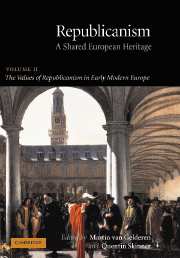Book contents
- Frontmatter
- Contents
- Contents of Volume I
- Acknowledgments
- Introduction
- Part I Republicanism and Political Values
- 1 Classical Liberty and the Coming of the English Civil War
- 2 Empire and Liberty: A Republican Dilemma
- 3 Republicanism and Toleration
- 4 The Mechanisation of Virtue: Republican Rituals in Italian Political Thought in the Sixteenth and Seventeenth Centuries
- 5 From Virtue to Politeness
- 6 From Civism to Civility: D'Holbach's Critique of Republican Virtue
- Part II The Place of Women in the Republic
- Part III Republicanism and the Rise of Commerce
- Bibliography
- Contributors
- Index of Names of Persons
- Index of Subjects
4 - The Mechanisation of Virtue: Republican Rituals in Italian Political Thought in the Sixteenth and Seventeenth Centuries
Published online by Cambridge University Press: 11 January 2010
- Frontmatter
- Contents
- Contents of Volume I
- Acknowledgments
- Introduction
- Part I Republicanism and Political Values
- 1 Classical Liberty and the Coming of the English Civil War
- 2 Empire and Liberty: A Republican Dilemma
- 3 Republicanism and Toleration
- 4 The Mechanisation of Virtue: Republican Rituals in Italian Political Thought in the Sixteenth and Seventeenth Centuries
- 5 From Virtue to Politeness
- 6 From Civism to Civility: D'Holbach's Critique of Republican Virtue
- Part II The Place of Women in the Republic
- Part III Republicanism and the Rise of Commerce
- Bibliography
- Contributors
- Index of Names of Persons
- Index of Subjects
Summary
In sixteenth- and seventeenth- century Italy, the word ‘republic’ was all but a synonym for Venice. When ‘republic’ was mentioned, Venice was automatically evoked. It is therefore Venice which I shall discuss in this essay. My interests currently focus on demonstrations of the republican spirit in the Venetian world in the sixteenth and seventeenth centuries, and on the ways in which this spirit was disseminated.
The fundamental elements of this are contained, as is well known, in Gasparo Contarini's De magistratibus et republica venetorum (1543) and Donato Giannotti's La republica de' Viniziani (1540). However, I believe that Contarini's work is much more important than Giannotti's in terms of providing a coherent interpretation of the Venetian world. Contarini was a Venetian aristocrat who tried to propose an image of his homeland which would serve, both at home and abroad, to reinforce the self-awareness of citizens on the one hand, and on the other, to disseminate the image of Venice as a model to be imitated by foreigners. Certainly, Contarini's work was much better known abroad than Giannotti's, thanks to the fact that it was translated into Latin, which meant that the European élite could read it, and thanks also to numerous translations into the main European languages (see Contarini 1599). John Pocock has spoken of ‘the mechanisation of virtue’ with regard to Contarini's work, and he has defined the description of Venice found therein as that of an ‘artificial angel’; this serves to confirm the beliefs of contemporaries, who held that Venice had managed to construct laws which could force Venetians to act in a virtuous manner (Pocock 1975).
- Type
- Chapter
- Information
- RepublicanismA Shared European Heritage, pp. 73 - 84Publisher: Cambridge University PressPrint publication year: 2002



